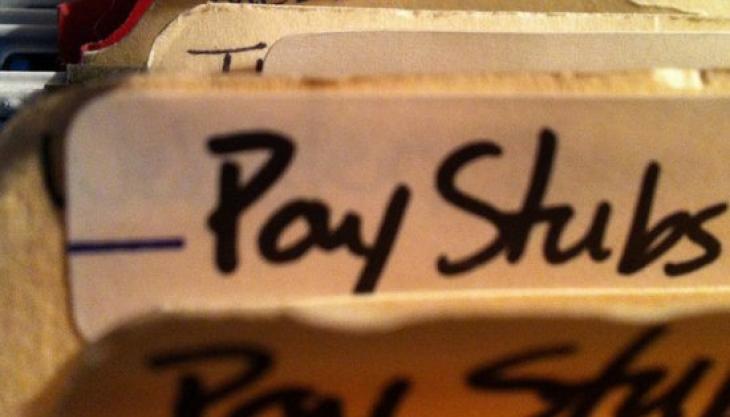What Assets of Yours Can a Creditor Garnish If You're Not Paying Your Bills?
Submitted by Rachel R on Tue, 07/22/2014 - 11:20am

Which assets are at risk for garnishment?
Image source: Flickr Creative Commons User C x 2
One of the nice things about living in North Carolina is that creditors generally cannot garnish your wages to try and collect past due bills. The IRS and North Carolina income tax authority can garnish your wages and your wages can also be garnished for child support and alimony if you're behind on payments. Also, up to 25% of your wages can be garnished for federal student loans. In North Carolina, many ambulance companies can also seize your wages.
And if you ever lived in another state when a debt was incurred, sneaky creditors can often garnish your wages if you work for an employer with offices in other states. Other than this, though, most creditors can't access your wages. But this won't stop them from going after other assets they think you may be holding on to.
How Can Creditors Get Access to Garnish Your Assets?
First, creditors just can't sneak up on you and take your stuff. The first step is to sue you and get a judgment against you. If you get a lawsuit notice, immediately consult with an attorney. It may help to answer the lawsuit, try to get the amount lowered or at least make sure they can prove they are entitled to collect the amount they're asking for. If you don't respond in writing and show up, the court will likely enter a default judgment in favor of the creditor and this is the ammunition they need to go for a garnishment.
Because they can't go after your wages in North Carolina, they will focus on other assets and property you have. In the spring, judgment creditors know you may be getting a tax refund and may pounce on it the moment it is deposited in your bank account – even before you can get to it. If you have cash in checking or savings, they may try to attach these accounts or if you have a vehicle that's paid off, they may try to get that. They may also try and put a lien on your home. With the judgment in hand, the creditor will then research you and try to figure out what you have, where you bank and what they can take to satisfy your debt. This is a bad position to be in.
What Assets Are Blocked from Garnishment by Creditors?
In addition to not being able to take your wages, creditors also cannot take your social security or SSI disability payments and many other public benefits such as unemployment insurance and Veteran's retirement benefits. However, if you have them going into an account that you routinely use to pay your bills and that also has other funds co-mingling with it, the funds may be at risk. Your best strategy, if you've been sued, is to open another account and move your SS, SSI deposits or other public benefits to it and not pay any bills from the account. From there, you can transfer money to your other account to pay your bills. This helps shield money you can't afford to have taken.
Other assets that can't be tapped by creditors include retirement funds such as your 401(k) or IRA. But what if your IRA is held with the same bank that you owe a debt to that you haven't paid? Sometimes, banks can take an offset to recover what you owe. For instance, if you owe $1,000 on a bank or credit union-issued card and haven't paid the bill but have $1,000 in your savings account, it may be in the fine print that they can offset if you default.
But this is absolutely not allowed if that account is an IRA. Ed Boltz, attorney from our law offices (the law offices of John T Orcutt) and president of the NACBA (National Association of Consumer Bankruptcy Attorneys) told Fox Business recently, “Banks have no better ability to get at retirement assets like your IRA than any other creditor.” So breathe a sigh of relief to know that your retirement accounts are safe from your creditors.
And if you're deep in debt, one of your best defenses against creditors collections, garnishments and harassment is to file a Chapter 7 or Chapter 13 bankruptcy if you've got far too many bills piled up and simply can't afford to pay them. Contact the law offices of John T Orcutt for a free consultation if you're deep in debt and looking for a financial fresh start.
Debts Hurt! Got debt? Need help? Get started below!
Serving All of North Carolina
- Bankruptcy Attorneys Raleigh NC (North)
- Bankruptcy Attorney Fayetteville NC
- Bankruptcy Attorney Durham NC
- Bankruptcy Attorneys Wilson NC
- Bankruptcy Attorneys Greensboro NC
- Bankruptcy Attorneys Southport NC
- Bankruptcy Attorneys Wilmington NC
Bankruptcy Attorneys Raleigh NC (North)
6616 Six Forks Rd #203 Raleigh, NC 27615 North Carolina
Tel: (919) 847-9750

Bankruptcy Attorney Fayetteville NC
2711 Breezewood Ave Fayetteville, NC 28303 North Carolina
Tel: (910) 323-2972

Bankruptcy Attorney Durham NC
1738 Hillandale Rd Suite D Durham, NC 27705 North Carolina
Tel: (919) 286-1695


Bankruptcy Attorneys Greensboro NC
2100 W Cornwallis Dr. STE O Greensboro, NC 27408 North Carolina
Tel: (336) 542-5993

Bankruptcy Attorneys Southport NC
116 N Howe St. Suite A Southport, NC 28461 North Carolina
Tel: (910) 218-8682

Bankruptcy Attorneys Wilmington NC
116 N. Howe Street, Suite A Southport, NC 28461 North Carolina
Tel: (910) 447-2987
